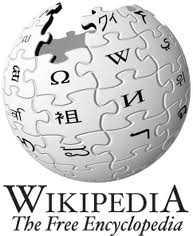My general practitioner might just have visitied Wikipedia when he did a Google search on some health topic he came across and needed more information on. A surprise? Well, no not really. I myself use it both outside my professional life and in my public health research life, so why shouldn’t my doctor. However, it is my sense that Wikipedia is still not something researcher talk about when they discuss how they search for information or how they share their own knowledge.
Last week I blogged about Wikipedia trainings at McMaster University in Canada and I seem to have not been able to let go of the topic of Wikipedia. Not having looked that carefully on the relevance of Wikipedia to public health before it wasn’t until now that I came by this article on how Wikipedia can be A Key Tool for Global Public Health Promotion.
![]() The article is published in the latest 2011 volume of Journal of Medical Internet Research (JMIR), a peer-reviewed transdisciplinary journal on health and health care in the Internet age. The authors , Dr James Heilman et al., are all members of the Wiki Project Medicine and therefore naturally advocates of developing Wikipedia in the field of the health.
The article is published in the latest 2011 volume of Journal of Medical Internet Research (JMIR), a peer-reviewed transdisciplinary journal on health and health care in the Internet age. The authors , Dr James Heilman et al., are all members of the Wiki Project Medicine and therefore naturally advocates of developing Wikipedia in the field of the health.
Based on a belief that Wikipedia’s potential to work as a tool for worldwide health promotion is underestimated, James Heilman et al. draws attention to and encourages medical professionals, their societies, patient groups, and institutions to help improve Wikipedia’s health-related entries. Using recent statistics on who uses Wikipedia they brings attention to the fact that Wikipedia is a major source of health information, both for many professional and the general public. Below some of the figures from the article:
“Studies have found that 70% of junior physicians use Wikipedia in a given week, while nearly 50% to 70% of practicing physicians use it as an information source in providing medical care [34–36]. The junior physicians used Wikipedia more frequently than all other websites excluding Google [34]. Of pharmacists who responded to a questionnaire, 35% admitted using it [37]. The medical articles on Wikipedia receive about 150 million page views per month, with the top 200 most-visited medical articles each receiving more than 100,000 views per month and the top 500 each receiving greater than 60,000 views per month [38].”
Part of the aim of the authors is to get the medical (and this would include the public health community I assume) to see the necessity but also benefits in participating in developing and quality ensuring the medical articles on Wikipedia.
They do this by discussing the intricacies, strengths, and weaknesses of Wikipedia’s health related entries. The listing of weaknesses and limitations of the online encyclopedia are very useful as they provide important background knowledge to be aware of both when using and contributing to Wikipedia.
Another useful listing in the article are a list of reasons why physician should contribute to Wikipedia (they highlights below are my highlights)
 It may be personally satisfying to provide an important educational service for individuals looking for health information, and to see articles grow that one created or improved.
It may be personally satisfying to provide an important educational service for individuals looking for health information, and to see articles grow that one created or improved.- While not having a high scientific impact, Wikipedia’s articles have a high social impact due to its broad readership. In the experience of the authors, a newly created article can often be found among the top Google results within a day, often outperforming review articles in highly regarded medical journals.
- Editing or adding information helps contributing students or professionals master the subject matter and learn more about the evidence underpinning it.
- Translating complex ideas into accessible concepts and language is an interesting intellectual challenge, which can help in everyday nontechnical communication with patients.
- Writing for Wikipedia teaches modern online communication.
- WikiProject Medicine offers participation and recognition in a Web-based international community.
Reading the list, I couldn’t help thinking whether adding to this list a public health obligation to share knowledge on a media which so many people use. Using the argument that medical professionals by contributing to health related entries live up to a responsibility of providing patients and colleagues with the correct information. Perhaps it is taking it a little too far, but then again my guess is that it could be a motivating factor for many physicians and researchers. In addition, there could be a benefit for researchers in sharing findings, research projects and results with a broader group and thereby live up to the obligation of communicating science and promoting their own research.
Having more people contribute to Wikipedia, however requires increased awareness and training in using it. The idea of familiarizing university students and staff through workshops as they have been doing at McMaster University is a relevant strategy. Perhaps it could even be taken a step further and included in mandatory classes on science communication.



